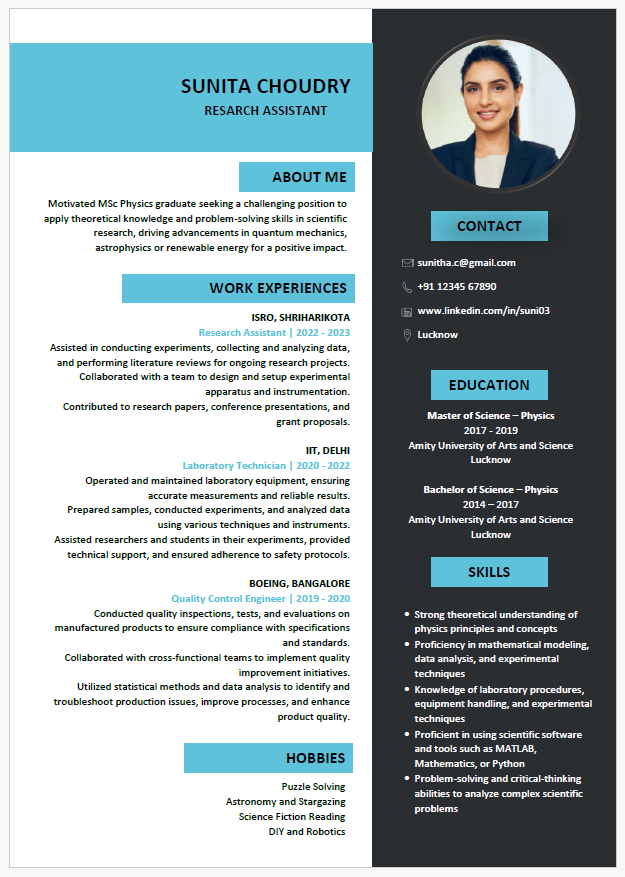Research Assistant
Master of Science – Physics

About this template
This is a very professional resume which can significantly enhance your job prospects.
With its clean, modern design and industry-tailored layout, it highlights your skills and achievements, making a strong impression on recruiters.
Some most important and common interview questions for MSc Physics Research Assistant
Here are some of the most important and common interview questions for an MSc Physics Research Assistant, along with brief answers that highlight key skills:
1. Can you describe your experience with experimental physics?
Experimental physics is a core aspect of research. I have hands-on experience in designing experiments, calibrating equipment, and analyzing data. My attention to detail and methodical approach ensure accurate and reliable experimental results.
2. How do you approach data analysis in your research?
Data analysis is crucial for interpreting experimental results. I use statistical software like MATLAB or Python to process and analyze data. My strong analytical skills help in identifying patterns and drawing meaningful conclusions from complex datasets.
3. What is your experience with scientific programming?
Scientific programming is essential for modeling and simulations. I am proficient in programming languages like Python and C++, which I use to write code for data analysis and simulations. My programming skills enhance my ability to solve complex physical problems.
4. How do you stay updated with the latest developments in physics?
Staying informed is key in research. I regularly read scientific journals, attend conferences, and participate in online forums. My dedication to continuous learning ensures that I am aware of the latest advancements and methodologies in physics.
5. Describe a challenging problem you encountered in your research and how you solved it.
Research often involves tackling complex problems. In one of my projects, I faced difficulties in aligning experimental results with theoretical predictions. By re-evaluating the experimental setup and refining the model, I was able to achieve consistent results, demonstrating my problem-solving skills.
6. How do you ensure the accuracy and precision of your experiments?
Accuracy and precision are critical in research. I meticulously calibrate instruments, conduct multiple trials, and use error analysis to minimize uncertainties. My commitment to rigorous experimentation ensures the reliability of my findings.
7. What is your experience with theoretical physics?
Theoretical physics underpins much of experimental work. I have a solid understanding of quantum mechanics, relativity, and statistical mechanics, which I apply to develop models and interpret experimental data. My theoretical knowledge complements my experimental skills.
8. How do you document your research?
Proper documentation is vital for reproducibility. I maintain detailed lab notebooks, write clear reports, and use software tools like LaTeX for scientific writing. My organizational skills ensure that my research is well-documented and accessible for future reference.
9. Can you discuss your experience with collaborative research projects?
Collaboration is key in scientific research. I have worked on several multidisciplinary projects, coordinating with team members and sharing insights. My communication and teamwork skills help in achieving collective research goals efficiently.
10. How do you manage your time when working on multiple research tasks?
Time management is essential in research. I prioritize tasks based on deadlines and complexity, using tools like project management software to track progress. My ability to manage time effectively ensures that I meet research milestones without compromising quality.